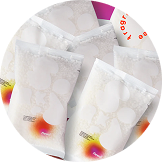From the physical tension and discomfort to the mental turmoil, stress can manifest itself in a number of ways - none of which feel good. Unfortunately, stress is all around us and can’t necessarily be avoided. This is why you need healthy methods for coping with stress.
One of the more interesting connections is that of magnesium and stress. You might know magnesium is responsible for a ton of different bodily processes (more than 300, in fact). But does magnesium help with stress? Why is magnesium good for stress?
There are actually a number of magnesium soak benefits for stress - it relieves muscle tension, lowers cortisol levels, supports serotonin production, and more. We’ll cover this in greater detail below and show you how to get started using magnesium for stress relief.
If you just want to skip to the good part where you’re feeling better and living life without the limitations stress puts on you, look no further than Flewd Stresscare. Our magnesium bath soak is specifically tailored to stop stress at the source. Spoil yourself today!
The Sinister Effects of Stress
Whether you harness the power of magnesium stress relief or something else, it’s imperative that you implement techniques for keeping stress at bay.
Stress can manifest as muscle tension, headaches, and fatigue - leaving you feeling miserable and preventing you from living life to the fullest. It’s more than just an uncomfortable feeling that can steal your lust for life, though.
Your body is constantly in a “fight or flight” state when stressed. This releases cortisol, which increases your heart rate and raises blood pressure. Over time this can contribute to cardiovascular strain, weakened immune function, and even digestive issues.
You might notice you're more prone to colds, stomach problems, or even chronic conditions like high blood pressure or heart disease. That’s just the physical side of things, too. Mentally, stress can be just as destructive.
It clouds your thinking, reduces your ability to concentrate, and makes even simple decisions feel overwhelming. Left unchecked stress can leave you feeling burnt out, irritable, and eventually, hopeless.
Sleep disturbances are also common, leaving you in a cycle of exhaustion that only worsens your mental and physical state. Fortunately, you don’t have to keep living this way. You have more control over stress than you might have realized.
Is Magnesium Good for Stress?
So, is magnesium good for stress? It's not just good, but one of the best defenses against stress you have at your disposal. Magnesium plays a key role in more than 300 bodily functions, and when it’s depleted, stress can run rampant and wreak havoc on your body and mind.
This natural relaxant can calm the nervous system, reduce cortisol production, and alleviate both physical and mental tension. The best part is supplementing with magnesium will also lead to an array of benefits beyond stress reduction.
So, let’s take a closer look - how does magnesium help with stress?
How Does Magnesium Help With Stress?
There are five different mechanisms by which magnesium helps with stress that we know for sure - although there may be others given how versatile and powerful this mineral is. Learn more about the link between magnesium and stress below!
Serotonin Regulation
Serotonin is that “feel good” hormone you hear so much about, and magnesium influences its production and regulation. Keeping serotonin levels balanced helps you feel more positive and resilient in the face of stress.
But with low serotonin levels, stress takes a more noticeable toll. You feel more anxious, low, or irritable. Making sure you get enough magnesium will help avoid this.
GABA Activation
GABA (gamma-aminobutyric acid) is a neurotransmitter responsible for calming the brain and reducing neural excitability. In more simple terms, it helps your mind slow down when it's racing with stress or anxiety.
So how does magnesium help with stress here? The mineral binds to GABA receptors in the brain, enhancing its calming effects. Studies have shown that lower magnesium levels are linked to decreased GABA activity. This makes it harder to relax.
Easing Tense Muscles
One of the most noteworthy magnesium stress relief mechanisms is the physically calming sense it provides. It’s no secret that stress can show itself through tight, sore muscles.
Magnesium helps here through its interaction with calcium, which is necessary for muscle contraction - but sometimes, can dominate and cause more harm than good. Magnesium will compete with calcium to prevent excessive muscle tension and cramping.
So not only will you feel better physically, but you may also feel as if your fight or flight mode has been turned down a bit.
Improving Sleep Quality
Good sleep is one of the most important ways to combat stress, but unfortunately, stress gets in the way of sleep. This vicious cycle can have compounding negative effects - you can’t sleep because you’re stressed, and then you get more stressed, and sleep worsens.
Magnesium can be a lifesaver as it activates the parasympathetic nervous system, which helps your body relax and prepare for sleep. It also regulates melatonin, which you may already know is the hormone that controls your sleep-wake cycle.
This is why one of the best ways to combat stress is with a healing bath soak recipe centered around magnesium right before bed. You’ll find yourself dozing off as soon as your head hits the pillow!
Reducing Inflammation from Stress
There’s one more benefit of magnesium for stress relief - it supports a healthy inflammatory response. But why does this matter?
Chronic stress can lead to inflammation in the body, which further exacerbates stress levels and can contribute to long-term health issues. We probably don’t have to remind you what a problem inflammation can pose.
But, magnesium is a natural anti-inflammatory that can reduce this stress-induced inflammation. It protects your body from the more concerning long-term effects of chronic inflammation. This is why it’s such a great component in any sore muscle bath soak homemade.
More Reasons to Love Magnesium
From energy production to nerve function, this nutrient is a key component in any wellness regimen even if you aren’t struggling with stress. As we said from the start, it plays a role in over 300 bodily processes. These include:
- Boosts heart health
- Supports bone health
- Regulates blood sugar
- Improves digestion
- Promotes energy production
- Protects brain function
- And many, many more!
In saying that, it’s one of the most important minerals in the human body. But as we’ll explore below, it’s not as simple as choosing any magnesium supplement you can get your hands on.
Choosing the Best Magnesium for Stress Relief
Not all magnesium for stress is created equal. If you’re trying to put stress on pause you need to be aware of both the different forms of magnesium AND the different types of supplements.
Different Forms of Magnesium
Magnesium is a unique mineral in that it’s available in SO many different forms, each with its pros and cons. But what we’re most interested in is bioavailability - which speaks to how much of the magnesium your body is actually able to put to use.
Common options include magnesium citrate, which is often used for digestive relief but can cause stomach upset, and magnesium glycinate, known for its calming effects and high absorption.
Magnesium oxide is fairly common and very cheap, but has poor bioavailability so your body won't absorb it efficiently. You get what you pay for. Magnesium malate is great for energy production and easing muscle pain as well, but is it the best? Not by a long shot.
The best magnesium for stress relief is without a doubt magnesium chloride. It’s by far the most bioavailable form of the mineral so you’re getting the best bang for your buck. When applied transdermally, it doesn’t have any side effects, either.
Speaking of transdermal, does magnesium soak into skin - or should you stick with oral supplements? Let’s take a look at the pros and cons of each below.
Oral vs Transdermal Supplements
The way you take magnesium is just as important as the type of magnesium. Oral supplements sound great in theory - they’re convenient and easy to find. They’re cheap, too. But there are two major problems:
- They have poor bioavailability. Magnesium is not absorbed through the digestive tract well, so most of the intake is excreted as waste. The solution is to take higher doses of magnesium so you get the optimal amount - but this leads to the next issue…
- They have uncomfortable gastrointestinal side effects. They’re notorious for causing bloating, diarrhea, or cramping - especially if you take higher doses to compensate for low absorption.
So, is magnesium soak good for you as an alternative? In comparing magnesium soak vs oral, transdermal magnesium is far superior. You can apply magnesium to your skin through bath soaks, creams, and other solutions.
This gets the mineral directly into your bloodstream so it can be distributed throughout the body as needed. This bypasses the digestive system, and thus, all those nasty side effects associated with oral supplements.
It also means you feel the stress-relieving effects of magnesium faster, putting tension and mental woes in the past within minutes. There are plenty of options at your disposal, from a DIY magnesium soak vs epsom salt. But your search for the best magnesium for stress ends here.
Shop at Flewd Stresscare Today!
Flewd Stresscare is here to help you overcome the challenges stress puts in your life with specially formulated magnesium chloride bath soaks. We use natural ingredients and offer a variety of solutions.
So, what is a bath soak you can choose at Flewd Stresscare? We recommend our stress relief bath soak bundle specifically, as it contains a few of our best sellers:
- Sads Smashing Soak: Packed with vitamins B3, B6, and nootropic lithium, this blend lifts your mood, helps combat emotional fatigue, and relieves mental heaviness.
- Anxiety Destroying Soak: Contains complex B vitamins and zinc, which work together to calm your nervous system, reduce anxious thoughts, and promote relaxation.
- Ache Erasing Soak: Designed for muscle recovery, this formula combines vitamins C and D with omega-3s to reduce inflammation and release built-up tension.
- Insomnia Ending Soak: With vitamins A and E and L-carnitine, this soak promotes deep, restful sleep by calming restless thoughts and regulating your sleep cycle.
From our muscle bath soak to our anxiety bath soak, relief is just a few clicks away. Order yours today and learn more about how to use bath soak below!
Tips on Using Magnesium for Stress Relief: Incorporating Regular Magnesium Soaks to Stop Stress at the Source
Part of what makes using magnesium soaks for stress such a powerful technique is that the combination of warm water with magnesium elevates the benefits. This is one of the best ways to end your day and enjoy some self-care. Here are some tips to make the most of it.
Setting the Mood
First things first, create the perfect ambiance for stress relief by dimming the lights or better yet, lighting a candle or two. After all, we recommend timing your soak for just before bed, and this will help you relax and unwind naturally.
You can choose to set the mood further with music, nature sounds, or some sort of guided meditation. You can also choose complete silence to be mentally present and work through some thoughts you’ve been anxious about.
Aromatherapy can also be a great addition as well. Try a few drops of lavender or eucalyptus oil in your bath to boost the soothing effects of your soak. There’s no right or wrong way to cultivate a calming atmosphere as long as you’re relaxed!
How Often Should You Soak and For How Long?
Using our soaks is easy - simply throw them in a tub of warm (not hot) water. Ideally, the temperature would be around 92-98°F. This will help you avoid overheating, which could counteract the calming effects. It could also cause dehydration.
As far as how long to soak in bath, we recommend at least 15-30 minutes. You can stay in longer if you’d like, but this will give you enough time to soak up all the goodness. After that, you can rinse off - but it’s not necessary since our soaks feature natural ingredients.
A good starting point is to soak 2-3 times a week, as this frequency will allow your body to steadily build up magnesium stores and chip away at the harmful effects of stress.
For more acute stress relief or muscle soreness, you can increase the frequency temporarily, but avoid over-soaking to prevent skin dehydration. It’s a good idea to follow up with a moisturizer - potentially one containing magnesium - to lock in the benefits and stay hydrated.
Other Stress Relief Tactics to Try
While magnesium for stress relief is a powerful first step, there are so many other solutions worth exploring. Some of these can be combined with your soak, like mindfulness or meditation.
Focus on your breathing, clear your mind, and let the warm water soothe your body. You can even practice simple deep breathing exercises to help lower your heart rate and calm your nervous system further.
After your bath, consider adding a few minutes of light stretching to release any lingering tension in your muscles. Gentle yoga or simple stretches can complement the muscle-relaxing benefits of magnesium, helping you feel even more relaxed post-soak.
Other tactics include journaling, exercising, and obviously, trying to eliminate unnecessary sources of stress in your life - be it toxic relationships or taking on too much at work.
But remember, stress is everywhere. It’s not something you can escape completely. Rather, you need to set yourself up for success in combating it. Now that you know the link between magnesium and stress, you’re well on your way!
Final Thoughts on Magnesium and Stress
So, does magnesium help with stress? Perhaps a better question - why is magnesium good for stress? In closing, this mineral fights stress right at the source, both physically and mentally.
From serotonin regulation to muscle relaxation, magnesium’s benefits are undeniable. When paired with the warm, calming embrace of a bath, you’ll practically feel the stress melting away by the minute.
Our blog has more resources on magnesium and stress, including how to make magnesium bath soak or the differences between a bath soak vs bath bomb if you’d like to learn more.
But at this point, the only thing left to do is order your magnesium stress relief bath soak and see firsthand what a difference it can make. Take the first step toward stress relief at Flewd Stresscare.
Reclaim your calm with our magnesium soaks and jumpstart your journey to relaxation!



















































